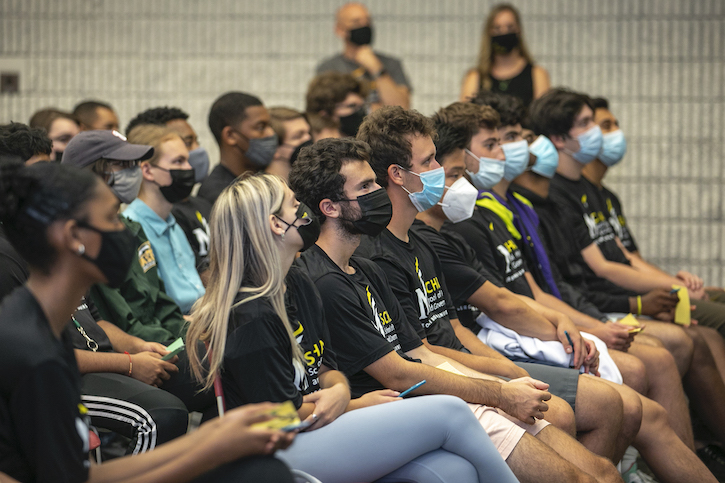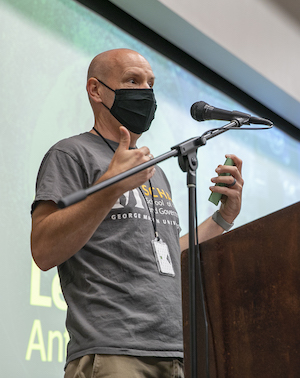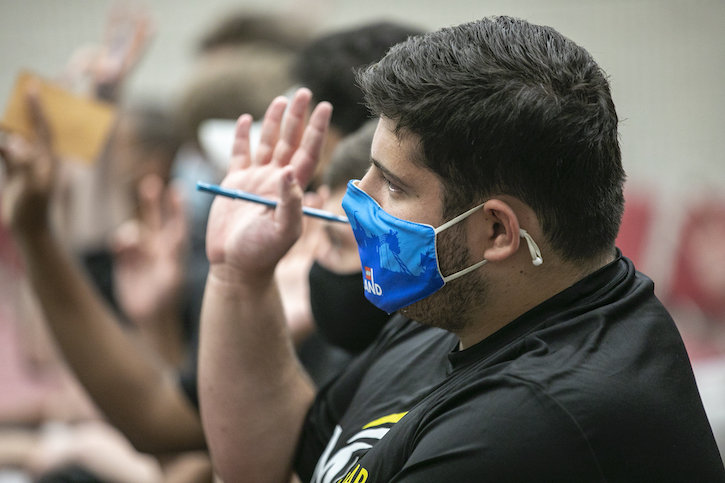In This Story

With thousands of people and countless opportunities, there’s a lot to take in at Virginia’s largest public research university. To help George Mason University students find community and boost their on-campus experience, Housing and Residence Life created Learning Communities (LC), where students with common interests live and learn together during the academic year.
Democracy Lab is one of the newest LCs. More than 60 freshmen from the Schar School of Policy and Government are enrolled for its inaugural year.

“[LCs] allow students to immediately have a network of peers and friends with common interests that can help them to feel a greater source of community,” said Peter Mandaville, Democracy Lab’s faculty director. “In some aspects, it makes a large university have the feel of a small liberal arts college.”
Mandaville said the lab’s name comes from the idea that democracy in America continues to be an ongoing experiment.
“Democracy is facing a whole set of challenges that we, as a nation, need to work through,” he said, mentioning issues like the effects of misinformation and social media, racism, socioeconomic inequality and political polarization. “This is a space where students can explore and talk about those issues.”
Democracy Lab students are enrolled in an Introduction to Democracy course. While the lab’s activities don’t formally follow the syllabus, students explore how larger philosophical questions discussed in the classroom relate to real-world challenges.
“Being in an LC with other people who share the same interests, goals and passions that I do has helped me grow as a person,” said Aarush Sivaram Jambunathan, a freshman studying government and international politics. “Everyone has a wide variety of viewpoints, but is respectful of [differing] views, and I truly feel the connections I’ve made here will last for the rest of my life.”
The experience can be transformational, said Gretchen Curry, the Schar School’s undergraduate programs manager and Democracy Lab co-coordinator.
“[LCs] allow students to have that one-on-one with faculty and staff, but also develop students’ personal interests,” she said. “Students enhance their academic experience, and grow as humans in the process.”
The lab’s fall semester focuses on major issues and debates, Mandaville said, while the spring semester shifts to what can be done about those issues and project-oriented work.
Students also hear from high-profile guests in the Washington, D.C., area and distinguished faculty.
The group’s inaugural event took place in August, with Mason President Gregory Washington speaking about how anti-racism and inclusive excellence are integral to democracy.
The lab connects students to opportunities.
“We want to help [students] get a better sense of the wide range of resources and expertise present in our faculty, and help them feel like they’re citizens of the school,” Mandaville said, mentioning the Schar School’s 90 full-time faculty.
Curry said the role of LCs is especially important in 2021.
“We’re offering this intentional experience for students when they’re coming off of a year and a half of a pandemic,” she said. “I’m hopeful and excited this is going to be an opportunity for them to really connect with each other and feel they have a place personally and professionally.”

